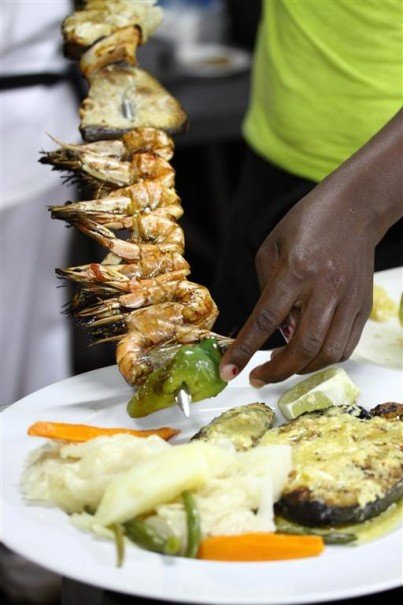
When Breakfast Becomes Lunch Becomes Dinner

When Breakfast Becomes Lunch Becomes Dinner
Barracuda in Maputo
Maputo’s skyline seems otherworldly in the sultry haze, a ghostly vista that might have been favored by Georges Seurat. While we have barely awakened, the skiffs have been out there for hours, about six or seven ramshackle fishing vessels at 100-foot intervals. Their captains call to each other every once in a while, but my basic Portuguese tells me their exchanges have little to do with the morning’s catch.
We had arrived just after duck on Catembe, a spit of land boasting immense foliage and dirt roads lying about a mile outside of the capital. Our passage from the mainland was secured by way of a clunking old ferry that strained its way across the bay, filled with Scandinavian backpackers and locals cradling plastic barrels of unsold crab.
As loathsome as it is to admit, there are moments in foreign travel that one cannot help but liken to those captured in film. Ascending the gangway at Catembe is just such a moment, an impossible similitude with the unnamed Caribbean island where Hannibal Lecter stalks Dr. Frederick Chilton at the end of Silence of the Lambs.
Languid streams of people passing the time until they have to do it all again, the proprietor of a wooden stall serving the returning urban migrants strong coffee and cheap cigarettes, yellowing palms breathing with the saturated wind: fertile hunting ground for the mind’s eye.
An uninterrupted night under the decades-old Catembe Gallery Hotel’s mosquito netting has restored us to some semblance of normality. The scene is altogether different now as we are sat on the deck of the hotel’s Marisol restaurant.
Our eyes desperately seek out the back of the menu. Coffee is for another time; Laurentina or 2M (pronounced doshem) are Mozambique’s native beers, and consequently have to be assimilated into the experience. Bacon and eggs are there, as is the ubiquitous Continental, but it is the towering prawn and barracuda espatada that immediately catches our eyes.
The challenge of devouring a fish known to attack humans is one that needs meeting. “And Leonardo,” we say to our hotel manager, who has taken a friendly interest in our party, “there’s absolutely no hurry.”
The Laurentina is cold and befitting of the day stretching out before us; light and carefree, and devoid of the industrial quality of so many mass-market beers. It truly is a product of its environment.
As we are the only people on the deck, there is absolutely no question we’ll be calling for another round. Again timing proves to be everything as Leonardo reappears, but on this occasion brandishing two metal spears on which are impaled prawns the size of knives and substantial slivers of fish.
“Enjoy, my friends,” beams Leonardo. “Let me get those beers, and you’ll tell me what you think when I come back.”
We unfurl the prawns from their masts and free them of their corral-colored sheaths. An urgent dip in the accompanying garlic butter, and the sensations are set in motion. An initial texture as smooth as the sands on the beach below, a slight burst in the mouth and all of a sudden a flurry of thick, rich flavors, kissed with a hint of spice. No guidebook literature on the gastronomy of East Africa would ever do justice to the Mozambican prawn. Words are a waste under these glorious circumstances.
Exaltation is about to take over when a piece of that mysterious fish catches my eye. More intimidating than most fish after a light searing, the similar cut nevertheless prompts me to let go of my inhibitions. I pinch off sections of succulent white meat with my fingers.
Immediately there is something different here. While for a moment there is a hint of salmon in the way it brushes the roof of the mouth, there is no question that it is of the Indian Ocean born; a deep, buttery taste so unrelenting that there is no option but to reach for more.
“So whaddya think?” booms a voice as two more beers are placed on the table.
When we return to our room eight hours later, breakfast having segued into a longer lunch and even longer dinner, Leonardo has his answer.